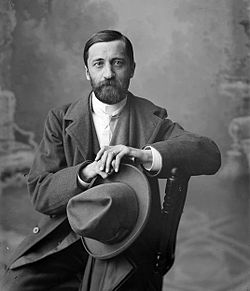Dmitry Merezhkovsky
Dmitry Sergeyevich Merezhkovsky was a Russian novelist, poet, religious thinker, and literary critic. A seminal figure of the Silver Age of Russian Poetry, regarded as a cofounder of the Symbolist movement, Merezhkovsky with his poet wife Zinaida Gippius was twice forced into political exile. During his second exile he continued publishing successful novels and gained recognition as a critic of Soviet Union. Known both as a selfstyled religious prophet with his own slant on apocalyptic Christianity, and as the author of philosophical historical novels which combined fervent idealism with literary innovation, Merezhkovsky was a nine times nominee for the Nobel Prize in literature, which he came closest to winning in 1933.
Dmitry Sergeyevich Merezhkovsky was born on August 2, 1866, in Saint Petersburg, the sixth son in the family. His father Sergey Ivanovich Merezhkovsky served as a senior official in several Russian local governors cabinets before entering Alexander IIs court office as a Privy Councillor. His mother Varvara Vasilyevna Merezhkovskaya was a daughter of a senior Saint Petersburg security official. Fond of arts and literature, she was what Dmitry Merezhkovsky later remembered as the guiding light of his rather lonely childhood . There were only three people Merezhkovsky had any affinity with in his whole lifetime, and his mother, a woman of rare beauty and angelic nature according to biographer Yuri Zobnin, was the first and the most important of them.
Source: Wikipedia

